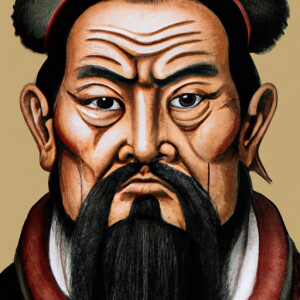
Sun Tzu, a renowned Chinese general, military strategist, and philosopher, lived during the Eastern Zhou period. His masterpiece, “The Art of War,” has achieved profound recognition as one of history’s most influential military treatises. Beyond its military applications, Sun Tzu’s philosophy emphasizes the significance of strategy, deception, and adaptability. This paper explores the key principles outlined in “The Art of War,” their broad impact, and the enduring legacy of Sun Tzu’s teachings in various domains.
1. Sun Tzu: The General, Strategist, and Philosopher:
Briefly introduce Sun Tzu as a Chinese figure from the Eastern Zhou period.
Highlight his status as a general, military strategist, and philosopher.
Emphasize the timelessness of his ideas and their relevance across disciplines.
2. “The Art of War”: A Classic and Influential Work:
Describe “The Art of War” as a renowned and influential book.
Explain its significance beyond military circles, extending to business, politics, and sports.
Discuss the book’s structure, comprising 13 chapters addressing different aspects of warfare, leadership, and strategic planning.
3. Key Principles from “The Art of War”:
a) Knowing Oneself and the Enemy:
Elaborate on the importance of self-assessment and understanding the strengths and weaknesses of both sides.
Highlight the role of this knowledge in effective decision-making.
b) Strategy and Planning:
Discuss Sun Tzu’s emphasis on meticulous planning and strategic thinking.
Explain how victory can be achieved by exploiting weaknesses, creating advantages, and minimizing risks.
c) Deception and Misdirection:
Explore Sun Tzu’s advocacy for the use of deception and illusion to confuse and mislead opponents.
Provide examples of tactics such as feigning weakness and gathering intelligence through spies.
d) Adaptability and Flexibility:
Emphasize the importance of adaptability and flexibility in response to changing circumstances.
Discuss how successful commanders adjust their strategies and tactics accordingly.
e) Leadership and Command:
Highlight the significance of strong leadership, clear communication, and effective command structures.
Discuss the role of trust and loyalty in inspiring troops.
f) Terrain and Timing:
Explain Sun Tzu’s consideration of terrain and timing as crucial factors in warfare.
Discuss the impact of understanding geographical and environmental conditions.
g) Winning Without Battle:
Explore Sun Tzu’s argument for achieving victory without engaging in direct conflict.
Discuss diplomatic means, alliances, and psychological warfare as methods of undermining the enemy’s will to fight.
4. The Enduring Influence of Sun Tzu:
Reflect on the broader impact of “The Art of War” beyond military contexts.
Discuss its application and relevance in business, politics, and sports.
Highlight the enduring popularity and study of Sun Tzu’s teachings in contemporary society.
Conclusion:
Sun Tzu’s “The Art of War” stands as a testament to the timeless wisdom of strategy, deception, and adaptability. His teachings, rooted in ancient warfare, continue to inspire and guide individuals in diverse fields. Sun Tzu’s emphasis on understanding oneself and the enemy, meticulous planning, and flexibility resonates with the quest for success and excellence in various domains. As we navigate the complexities of the modern world, Sun Tzu’s profound insights remain invaluable for those seeking strategic advantage and effective leadership.
